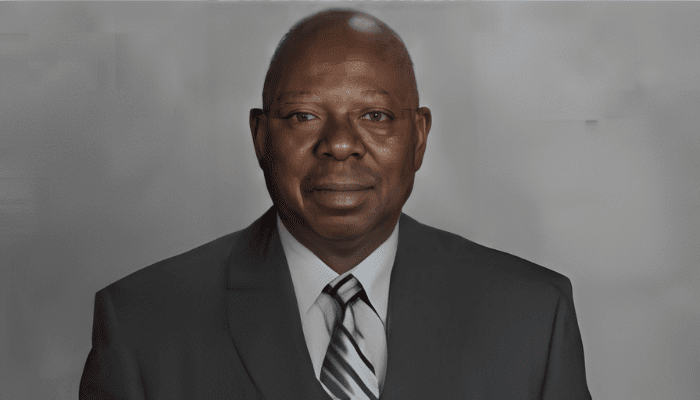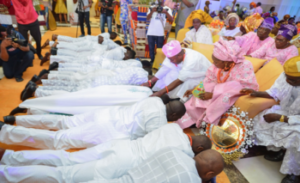


In celebration of a remarkable journey: Olatunji Dare at 80
…Speech delivered by Commissioner for Information and Strategy, Lagos State, Gbenga Omotoso, at the celebration of Prof. Olatunji Dare’s 80th birthday, organised by The Nation and the Nigeria Guild of Editors on July 17, 2024 at Radisson Hotel, Ikeja, Lagos
I am really excited to be the Lead Speaker on this important occasion put together by an important organisation in celebration of the birthday of a Very Important Personality (VIP). I do not know how the Guild of Editors chose me for this all-important task.
Am I the most qualified to do justice to the theme of the day, “Same craft, changing times – the columnist as societal conscience”? I do not think so; there are many literary criticism experts who can do a good job of this theme. Incidentally, some of them are sitting right here in this hall.
Nevertheless, I thank The Guild and “The Nation” for this rare opportunity.
I may claim not to be an authority in dealing with the matter at hand, but I cannot in good conscience insist that I do not know the subject of this gathering well enough to say a few words about him. In other words, permit me not to dwell only on the writings of Prof. Olatunji Dare, one of Nigeria’s best-known journalists, journalism educators, and public intellectuals who, no doubt and by all standards, has remained the conscience of the society. I would like to look at our man beyond his art because he has had so much influence on many of us in the course of being a teacher, a mentor, an uncle, an adviser and a father-figure.
To Dare, identifying with young and ambitious people comes naturally. He would never allow them to get stranded – no matter the situation. I remember when “The Nation” made its debut on July 31, 2006, Managing Director/ Editor-in-Chief Victor Ifijeh and I launched a desperate search for writers. Many shunned us because they did not want to write for an unknown newspaper. They were not sure of the fate of the newspaper at a time when many publications could barely fend for themselves. Not Dare; he signed up immediately, saying: “Go ahead and use my name in whatever way you think will be of benefit to the newspaper.” What a relief for us! We went ahead to advertise that the respected Journalism teacher would be among the various frontline writers we would be parading. Besides, he took on the title of Editorial Adviser. He plays that role till date, using his deep experience in the trade to advise us on critical and sensitive stories.
Needless to say, many who were familiar with his writings switched their loyalty to “The Nation”. Dare wrote under the column “At Home Abroad” in which he treated various subjects that were topical in a manner no other columnist had done – in a humorous, hilarious and simple manner that drew attention to the column every week. But in his writings you would easily appreciate the complexity of the thoughts that resulted in the final work.
In Dare’s hands, words are like clippers in the hands of a barber; he can weave them together in a unique manner to deliver a fantastic submission week after week. He also wrote in very serious language to speak truth to power whenever the need arose. But some readers who could not comprehend his satire did not find it funny and they said so. The writer would laugh and urge them not to take offence. But he was not happy at being sometimes misunderstood because of his style. I understand why this is so. Dare, as a communications teacher, would not like to be charged with being esoteric and unable to communicate in a manner that many will understand. In other words, he would not want to be accused of talking to himself.
However, to the subjects of the articles, either in military uniform or in flowing “agbada”, they were like a bullet that went through a tiny hole and tore its way out to inflict the maximum pain. They did not find them funny at all.
As I was saying, we found some frontline writers, among them Mohammed Haruna, the “Northern Star” who also drew substantial readers to the newspaper by making it representative of the Northern part of the country. Then, for several weeks, Mohammed Haruna’s column, “People & Politics”, did not appear in the paper. He was away on a rather long journey. I decided to fill the gap. Dare suggested the title of my column, “Editorial Notebook”. After some six or so weeks, Mohammed Haruna returned. I surrendered the column and announced that “Editorial Notebook” was rested. Prof. Dare called from his base in Illinois, United States, to advise me not to drop the column. “You can do it once in two weeks,” he counselled. I do not regret taking that advice as the column went on to win awards.
Reflecting on Prof. Dare’s journey, it is evident that his legacy is one of dedication, innovation, and compassion. His impact on journalism and the lives of those he has mentored is enduring. On this special day, we express our deepest gratitude for his guidance, support, and the invaluable lessons he has imparted.
Born on July 17, 1944, Prof Olatunji Dare began his academic journey studying Physics, a testament to his profound intellectual curiosity. However, his path took a transformative turn as he ventured into the world of journalism, where he has excelled.
I once wrote an article on the occasion of Prof. Dare’s birthday 10 years ago. Permit me to quote some paragraphs from that piece. “If Osoba is the Aremo (the chosen one, the favourite) of reporting in Nigerian journalism, Prof. Olatunji Dare is the Jose Mourinho (the Special One), the master satirist. To him, humour comes naturally. But many do not know that Prof. Dare was a Physics teacher.
“I have gained immensely from his amazing talent. In fact, to him I owe the name of this column. Dare finds it so easy to write on any subject, making something out of nothing and spicing it all up with a huge dose of humour, forcing you to laugh in a country where there is little to provoke even a smile.
“Like the late Baba Alabi, Dare detests errors. You dare not second guess him. He will reprimand you severely. But, ironically, he believes a newspaper is a miracle. “Every time a newspaper hits the newsstand, I know a miracle has happened,” says the professor, “because in the course of production, a thousand and one things could have gone wrong.”
“Many have written about Dare’s resolute stand on the June 12 debacle, how he refused to join The Guardian team that went to burnish the late Gen. Sani Abacha’s ego for him to reopen the newspaper, which he shut down in a senseless show of power, how their week was incomplete without reading “Matters Arising” and how he quit Rutam House.
“None has, however, recalled that Dare actually wore a lush beard for months – in protest against all that he went through. It is a tribute to his forgiving spirit that Mrs. Maiden Ibru, the publisher of “The Guardian”, was at MUSON Centre last Thursday when Dare was being honoured.
“Mrs. Ibru spoke of how great and influential the newspaper was, ascribing it all to the presence of many, including Dare. That was a remarkable tribute.” End of quote.
Indeed, no tribute will be complete without the dramatic exit of Prof. Dare from Rutam House. After the Abuja mission had been completed, a management meeting was summoned. It was resolved that those who were supposed to go to Abuja but refused should not partake in the fruits of the trip. In fact, I learnt, Prof. Dare was specifically named by proponents of that proposal. As the management was contemplating on who and how to break the news to Dare, he tendered his resignation letter. It was shocking. “Since I didn’t participate in the resolution of the crisis,” he was quoted as saying, “I think it will be unfair to those who did if I benefit from the gains of the trip.”
If this is not courage, I wonder what can be so called. Such is Dare’s stubborn disposition to the principles he holds dear.
Then he lost friends and relations as well as livelihood as the June 12 struggle continued. As the Abacha terror machine remained on the prowl, Dare left for the United States from where he continued to speak truth to power and torment his traducers.
The full story of Gen. Ibrahim Babangida’s barber-chair transition that culminated in the June 12 chaos is well captured in the book, “Diary of a Debacle (Tracking Nigeria’s failed Democratic Transition, 1989-1994),” authored by Dare. He derides Babangida who he has not forgiven for his odious role in the tragedy and scorned to no end the Interim National Government (ING) headed by Abiola’s kinsman, the late Chief Ernest Shonekan, whose acceptance of the odd job, many said, foreclosed any bold attempt to restore Abiola’s mandate. All those who played one ignoble part or the other got thoroughly spanked by Dare at the least opportunity. He lashed the late Arthur Nzeribe whose rogue Association for Better Nigeria (ABN) threw a spanner in the works. Abimbola Davies, Justice Bassey Ikpeme and many others got scurrilous and bitter recriminations from Dare.
Going by his reputation. Dare deserves all the accolades that may be showered on him by those who still hold dear all the values the wordsmith represents – humility, hard work, courage in the face of daunting situations, generosity and trust. These are some of the hallmarks of a true “omoluabi”, which he personifies.
For nearly a decade, he served as editorial page editor and chair of the Editorial Board of “The Guardian”, where his award-winning and wide-ranging weekly column, in turn satirical and serious, attracted a wide appreciative national audience.
You will agree with me that his weekly column for “The Nation”, now in its 14th year, is of the same vintage and has drawn high praise for its insights, elegance and felicity of style.
Dare’s career has been distinguished by numerous achievements and sterling contributions. No fewer than two university students have found in his satirical writing the subject of their M.A. theses. It has also featured in courses on Stylistics in programmes in the English Department of some universities. To mark his contributions to journalism and to public discourse in Nigeria, 20 of his contemporaries, colleagues and former students on three continents in July 2014 presented a festschrift on his 70th birthday titled “Public Intellectuals, the Public Square & The Public Spirit: Essays in Honour of Olatunji Dare.”
Unlike many of today’s commentators who were never groomed in the art of reporting, Dare has been a reporter, filing reports from several parts of the world. His works have been published in “West Africa,” “Newsday,” and “The Seattle Times.”
In 1995, he was awarded the Louis M. Lyon Prize for Conscience and Integrity in Journalism, by the Nieman Foundation at Harvard University, in recognition of his steadfast commitment to journalism’s best practices.
Dare left Nigeria in 1996 to take up a faculty position at Bradley University, Peoria, Illinois. He was honoured with the Hammet/Hellman Grant for Courage in the face of Political Persecution, presented by the global rights body, Human Rights Watch.
In summer 2000, he served as an editorial writer for “The Seattle Times,” based on a competitive fellowship awarded by the American Society of Newspaper Editors. Previously, he had conducted journalism workshops in Zimbabwe, Ghana, and across Nigeria.
Dare’s numerous prizes include the Nigerian Media Review award for Informed Commentary, the Faculty Award in Teaching Excellence as well as the Faculty Award for Excellence in Scholarship from the Slane College of Communication and Fine Arts, and the President’s Prize for Meritorious Service from Bradley University, Peoria, Illinois, where he was a full professor until August 2015 when, on his retirement, he was named Professor of Journalism, Emeritus.
He was presented with a Lifetime Achievement Award by the Nigeria Media Review in 2018. Dare earned the first-ever First Class (summa cum laude) degree in Mass Communication from the University of Lagos, Nigeria, where he subsequently became senior lecturer in journalism. He also holds a master’s degree in journalism from Columbia University, in New York, where he was the prizeman in Editorial Writing, and a Ph.D. from Indiana University, Bloomington, Indiana, with twin concentrations in International Communication and Public Policy.
A much-travelled journalist, Dare has reported from more than a dozen datelines on three continents and interviewed several statesmen of global stature. Only a few reporters can match the list; it is long: Former President of Togo Gnassingbe Enyadema; the late Nelson Mandela of South Africa; Jonas Malheiro Savimbi, the Angolan revolutionary, politician, and rebel military leader who founded and led the National Union for the Total Independence; Helmut Schmidt, the former West Germany Chancellor; the late Mathieu Kèrèkou, former President of Benin Republic; Kenneth Kaunda, former President of Zambia who served as the first president of Zambia from 1964 to 1991; Rajiv Gandhi, former Prime Minister of India.
Dare interviewed also Salim Ahmed Salim, former OAU Secretary General; F. W. De Klerk, former South African President and Mangosuthu Buthelezi, former leader of the Inkatha Freedom Party, Premier of KwaZulu Natal Province and one of the prominent politicians of the apartheid era.
In “The Columnist’s Agenda,” my contribution to “Nigerian columnists and their art,” edited by Lanre Idowu, another distinguished journalist and publisher, I wrote: “A good column should be like a soothing balm, giving hope where there seems to be hopelessness. In it must be found the proverbial light at the end of the tunnel. It must be exciting. It must be humorous, with a sting in the tail. And it must give the reader, always, something to remember.”
I then went on to name some of the great columns ever run in Nigerian newspapers, among them Olatunji Dare’s “Matters Arising.” I wrote: “It was one of the longest running columns in “The Guardian.” Many years after it stopped running, many are still enamoured of the column’s style – witty, breezy, yet deep and, sometimes, hilarious, full of satiric punches that evoked tears and laughter at the same time.”
It is difficult, even for the best of critics, to pick Dare’s best articles. Indeed, some stand out. In “Thoughts on birthday gifts,” published in “The Guardian” of August 13,1991, Dare writes: “An unfailing dependable source tells me some enterprising young Nigerian journalists have placed an order for a specially designed pocket mirror, to be presented to the Minister of Information, Chief Alex Akinyele, on his next birthday … .” The late Chief, with his trademark moustache, was always dandy, fashionable. He was arguably easily the most recognizable of all public officials of his era. This article won the prize for Informed Commentary at the First Diamond Awards for Media Excellence (DAME).
Nor would anybody forget “The vanishing Calabar man.”
Readers of “The Nation” may have noticed that “At Home Abroad” has not been as regular as it used to be. I was moved recently when Prof. Dare confided in me that he might rest the column. “I have said all that I should; let others have their say,” he told me.
I disagree sir. You once told us that you would continue to write for as long as we felt you were making sense. You still make so much sense. Please, keep the flag flying. Should this be impossible, we will surely show understanding.
Happy 80th birthday sir. May your day be filled with joy and celebration, and may you continue to inspire us all with your wisdom and kindness. Here’s to many more years of health, happiness, and cherished moments.
Thank you all for listening.



